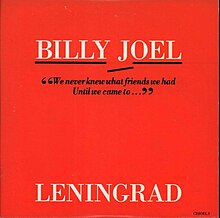Leningrad (song)
| "Leningrad" | ||||
|---|---|---|---|---|
 | ||||
| Single by Billy Joel | ||||
| from the album Storm Front | ||||
| B-side | "Goodnight Saigon" "Vienna" "Scandinavian Skies" | |||
| Released | December 4, 1989[1] | |||
| Length | 4:06 | |||
| Label | Columbia | |||
| Songwriter(s) | Billy Joel | |||
| Producer(s) |
| |||
| Billy Joel singles chronology | ||||
| ||||
"Leningrad" is a 1989 song written and performed by American singer-songwriter Billy Joel from his album Storm Front (1989), released as a single in Europe only. The song title is derived from the contemporary name of St. Petersburg, Russia. It was included on his Greatest Hits Vol. 3 compilation in 1997.
Synopsis
[edit]The song was written by Joel about a Russian clown named Viktor Razinov, whom he met while touring the Soviet Union in 1987. Throughout the song, major items of Viktor's and Billy's lives are compared to show the cultural differences and similarities of the United States and the Soviet Union.
In the song, Joel describes Viktor's life as one of many Soviet children who lost fathers during World War II, specifically during the siege of Leningrad. He enlisted in the Red Army, drank vodka to fight the pain, and then became a circus clown, bringing joy to Russian children.
Joel described his childhood life as being "born in '49, a Cold War kid in McCarthy time". He briefly describes his life living near Levittown, and the fear of the Cuban Missile Crisis. Joel also makes a reference to the Korean War, a proxy war to the Cold War, as well as the Vietnam War.
In the end, the two meet after Joel's Leningrad concert (Viktor had journeyed across the Russian Soviet Federative Socialist Republic to see all six of the Russian concerts), where Viktor draws a laugh from Joel's daughter, Alexa Ray Joel. Billy Joel and Viktor Razinov embrace afterward. In the song's last line, Joel sings: "We never knew what friends we had, until we came to Leningrad."
The quote is printed on the single cover, but not on the cover of the 4-track CD, which instead features the titles of the extra songs: "Goodnight Saigon", "Vienna", and "Scandinavian Skies".
In 2015, Razinov traveled to New York City to see Billy Joel's concert in Madison Square Garden. For this reunion, Joel played "Leningrad", which he rarely plays live.[2]
The backup vocals for this song were sung by members of the Hicksville High School Choir.[3] It was a group of students selected by Hicksville High School choir director, Charles "Chuck" Arnold, who wrote the harmonies.[3] He retired in 1989 and remained in touch with Joel, who went to high school in Hicksville before quitting to start his music career. He offered this opportunity to his students as a tribute to him and his influence on Joel in his early years. Arnold was later singled out at a sold-out Denver, CO, show on August 8, 2019.[4]
Critical reception
[edit]Upon single release Melody Maker reviewer Mick Mercer branded an artist as "Not a Boring Bastard Anymore" and called the song "understated ballad, with one great line" about Cold War kids.[5]
Charts
[edit]
Weekly charts[edit]
|
Year-end charts[edit]
|
See also
[edit]References
[edit]- ^ a b "BILLY JOEL - LENINGRAD". dutchcharts.nl. Retrieved June 21, 2021.
- ^ "Exclusive Billy Joel MSG Backstage & Concert Photos – October 21, 2015". BillyJoel.com. October 21, 2015. Retrieved August 12, 2022.
- ^ a b Storm Front - Billy Joel | Credits, retrieved April 16, 2023
- ^ "Billy Joel's music teacher was at his Coors Field show (and he lives in Colorado)". KUSA.com. August 9, 2019. Retrieved April 16, 2023.
- ^ Mercer, Mick (December 9, 1989). "Singles: Billy Joel – "Leningrad" (CBS)". Melody Maker. London: IPC Limited. p. 32. ISSN 0025-9012. Archived from the original on March 28, 2024. Retrieved June 6, 2024 – via Flickr.
- ^ [1] (Retrieved September 17, 2012)
- ^ "Eurochart Hot 100 Singles" (PDF). Music & Media. March 24, 1990. Retrieved June 18, 2021.
- ^ "InfoDisc : Tout les Titres par Artiste". Archived from the original on June 14, 2012. Retrieved August 10, 2011.
- ^ Dutch Top 40 1990. Retrieved January 8, 2009.
- ^ "INFINITY CHARTS: German Top 20". ki.informatik.uni-wuerzburg.de. Archived from the original on November 5, 2013. Retrieved July 6, 2013.
